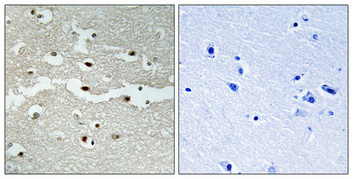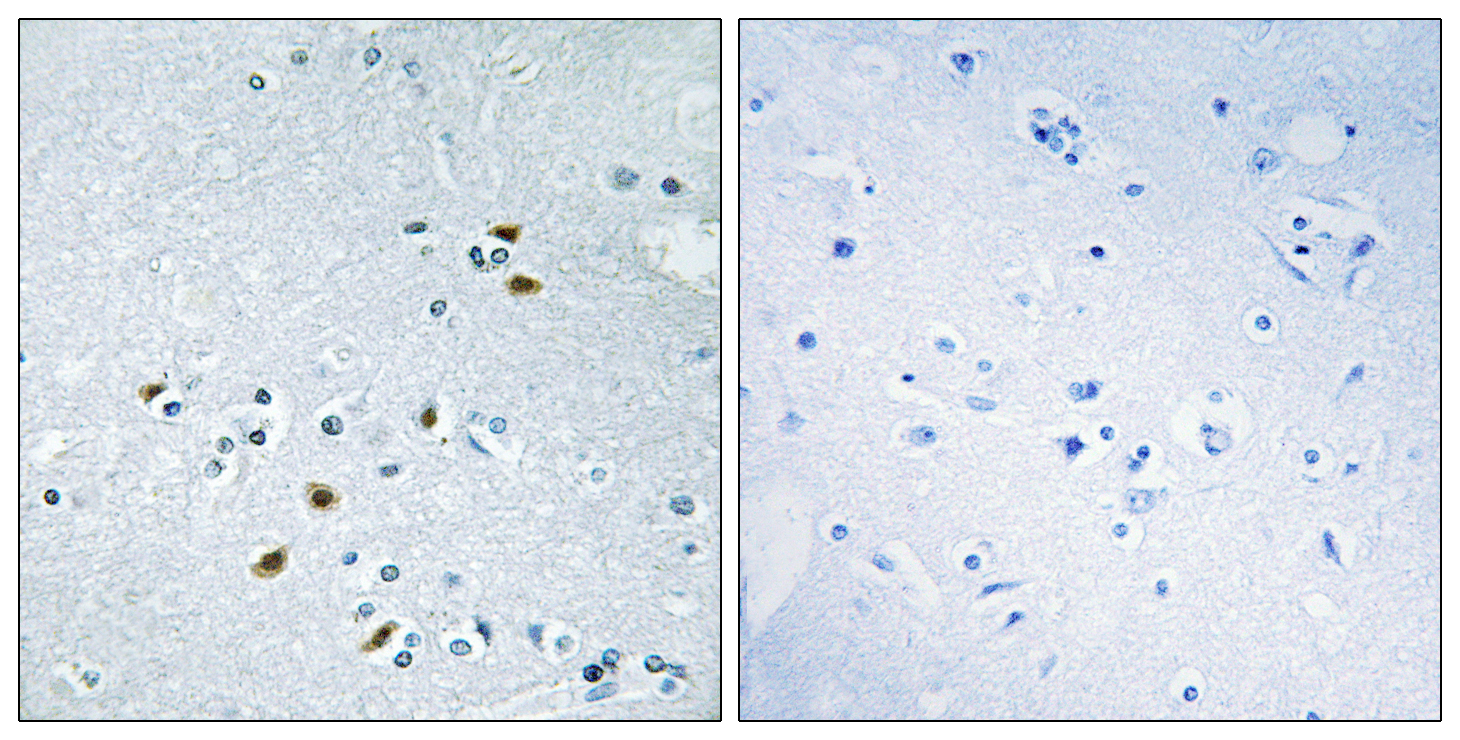BRCA2 Polyclonal Antibody
- Catalog No.:YT0520
- Applications:IHC;IF;ELISA
- Reactivity:Human;Rat
- Target:
- BRCA2
- Fields:
- >>Homologous recombination;>>Fanconi anemia pathway;>>Pathways in cancer;>>Pancreatic cancer;>>Breast cancer
- Gene Name:
- BRCA2
- Protein Name:
- Breast cancer type 2 susceptibility protein
- Human Gene Id:
- 675
- Human Swiss Prot No:
- P51587
- Mouse Swiss Prot No:
- P97929
- Rat Swiss Prot No:
- O35923
- Immunogen:
- The antiserum was produced against synthesized peptide derived from human BRCA2. AA range:31-80
- Specificity:
- BRCA2 Polyclonal Antibody detects endogenous levels of BRCA2 protein.
- Formulation:
- Liquid in PBS containing 50% glycerol, 0.5% BSA and 0.02% sodium azide.
- Source:
- Polyclonal, Rabbit,IgG
- Dilution:
- IHC 1:100 - 1:300. ELISA: 1:20000.. IF 1:50-200
- Purification:
- The antibody was affinity-purified from rabbit antiserum by affinity-chromatography using epitope-specific immunogen.
- Concentration:
- 1 mg/ml
- Storage Stability:
- -15°C to -25°C/1 year(Do not lower than -25°C)
- Other Name:
- BRCA2;FACD;FANCD1;Breast cancer type 2 susceptibility protein;Fanconi anemia group D1 protein
- Molecular Weight(Da):
- 384kD
- Background:
- Inherited mutations in BRCA1 and this gene, BRCA2, confer increased lifetime risk of developing breast or ovarian cancer. Both BRCA1 and BRCA2 are involved in maintenance of genome stability, specifically the homologous recombination pathway for double-strand DNA repair. The BRCA2 protein contains several copies of a 70 aa motif called the BRC motif, and these motifs mediate binding to the RAD51 recombinase which functions in DNA repair. BRCA2 is considered a tumor suppressor gene, as tumors with BRCA2 mutations generally exhibit loss of heterozygosity (LOH) of the wild-type allele. [provided by RefSeq, Dec 2008],
- Function:
- disease:Defects in BRCA2 are a cause of genetic susceptibility to breast cancer (BC) [MIM:612555, 114480]; also called susceptibility to familial breast-ovarian cancer type 2 (BROVCA2). BC is an extremely common malignancy, affecting one in eight women during their lifetime. A positive family history has been identified as major contributor to risk of development of the disease, and this link is striking for early-onset breast cancer. Mutations in BRCA2 are thought to be responsible for some inherited breast cancer. It is linked with male breast cancer.,disease:Defects in BRCA2 are the cause of Fanconi anemia complementation group D type 1 (FANCD1) [MIM:605724]. Fanconi anemia [MIM:227650] is an autosomal recessive disorder affecting all bone marrow elements and associated with cardiac, renal, and limb malformations as well as dermal pigmentary changes.,function:Involved in double-strand
- Subcellular Location:
- Nucleus . Cytoplasm, cytoskeleton, microtubule organizing center, centrosome . Colocalizes with ERCC5/XPG to nuclear foci following DNA replication stress. .
- Expression:
- Highest levels of expression in breast and thymus, with slightly lower levels in lung, ovary and spleen.
- June 19-2018
- WESTERN IMMUNOBLOTTING PROTOCOL
- June 19-2018
- IMMUNOHISTOCHEMISTRY-PARAFFIN PROTOCOL
- June 19-2018
- IMMUNOFLUORESCENCE PROTOCOL
- September 08-2020
- FLOW-CYTOMEYRT-PROTOCOL
- May 20-2022
- Cell-Based ELISA│解您多样本WB检测之困扰
- July 13-2018
- CELL-BASED-ELISA-PROTOCOL-FOR-ACETYL-PROTEIN
- July 13-2018
- CELL-BASED-ELISA-PROTOCOL-FOR-PHOSPHO-PROTEIN
- July 13-2018
- Antibody-FAQs
- Products Images

- Immunohistochemical analysis of paraffin-embedded Human brain. Antibody was diluted at 1:100(4° overnight). High-pressure and temperature Tris-EDTA,pH8.0 was used for antigen retrieval. Negetive contrl (right) obtaned from antibody was pre-absorbed by immunogen peptide.

- Immunohistochemistry analysis of paraffin-embedded human brain tissue, using BRCA2 Antibody. The picture on the right is blocked with the synthesized peptide.



